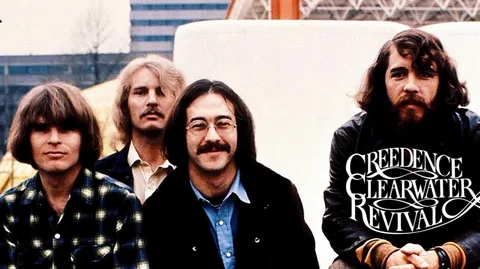
A train-beat rush through late-’60s America—city noise, nervous motion, everyday overwhelm—turned into three minutes of purpose and grit.
If you fell in love with Creedence Clearwater Revival back when the radio still hissed at night, you probably met “Commotion” as the flip side you couldn’t ignore. Issued in July 1969 as the B-side to “Green River,” then appearing weeks later on CCR’s album Green River (released August 7, 1969), it’s the rare B-side that elbowed into the spotlight—peaking at No. 30 on the Billboard Hot 100 in the U.S. and cracking the Top 20 in Germany. Written and produced by John Fogerty and cut at Wally Heider Studios, San Francisco during the band’s white-hot spring sessions, the record captures a quartet moving like one engine: Doug Clifford’s snare hammering that “train beat,” Stu Cook’s bass locking the rails, Tom Fogerty’s rhythm chopping time, and John’s lead guitar scraping sparks.
Those release details matter because 1969 was CCR’s most furious year—three studio albums in twelve months—and Green River was the moment they hit cruising altitude, topping the Billboard 200 and pinning down the sound we now call swamp rock: tight, unfussy, and built for the open road. On that LP, “Commotion” is Track 2, a burst of kinetic worry that sits between the pastoral memory of “Green River” and the fatalistic sigh of “Lodi.” It’s the record’s nervous system, the place where CCR turns cultural noise into musical motion.
What, exactly, is the song talking about? Fogerty’s own descriptions are wonderfully plain. He framed “Commotion” as a fast, train-beat piece—a two-minute impression of city life’s hurry and hassle, the clatter of traffic, blaring televisions, and the general racket of modern living. Critics heard the same thing; one 1969 blurb called it a “hard rock item with a strong lyric line,” admiring how the band’s rhythm foundation kept the song charging forward. Later writers have read it as a metaphor for the broader social and political turbulence of the era, not as didactic commentary but as a musician catching what was “in the air.” That’s always been CCR’s trick: take something gnawingly familiar—the noise—and give it a beat you can move through.
Musically, the record snaps like a clothesline in a gust. The intro riff is all urgency; the groove bucks and surges without ever growing messy. John Fogerty sings in short, clipped phrases, as if he’s got to shout over the rush-hour din—“Traffic in the city, turns my head around”—yet he never abandons melody. The guitars don’t grandstand; they punctuate, flicking off little sparks between the vocal lines. Listen to how the band breathes as a unit: fills are brief, transitions are tight, the song says what it needs to say and then gets out. In an era of ten-minute jams, CCR served the opposite sermon: discipline is a kind of soul. (Even in the studio notes, you feel that intent; these were focused dates at Wally Heider’s with engineer Russ Gary, the beginning of a partnership that helped cement the group’s punchy, unfogged sound.)
Chart-wise, the single tells its own story of resonance. As a B-side riding the wake of a monster A-side, “Commotion” still cracked the Top 40—no small feat in the summer of 1969, when the airwaves were crowded with psychedelic epics, Motown power, and British invasions vying for your nickel. That it rose to No. 30 in the U.S. and No. 16 in Germany shows how deeply that restless pulse connected with listeners beyond CCR’s core. And remember: Green River was the band’s second LP of the year; by the time autumn arrived, “Down on the Corner” and “Fortunate Son” would follow, making 1969 feel like one long CCR broadcast.
For older ears, part of the song’s warmth is the way it names a feeling without scolding it. “Commotion” doesn’t lecture about modern life; it recognizes the scramble—the bills, the traffic, the headlines—and gives you something steady to walk it off. It’s blue-collar modernism: three minutes of order against the static. That’s why the track still lands today, long after the particular cars and billboards have changed. Spin it, and you’ll feel the old muscle memory: the car idling at a light, the DJ’s voice fading, that familiar CCR gallop lifting your jaw from your chest. In the end, that’s the enduring grace of “Commotion” and of Green River as a whole: noise will always be with us, but so will rhythm; and if you can find the beat, you can keep moving.
Essential credits: Song: “Commotion.” Artist: Creedence Clearwater Revival. Album: Green River (Fantasy Records). Writer/Producer: John Fogerty. Recorded: March–June 1969, Wally Heider Studios (San Francisco). U.S. chart peak: No. 30, Billboard Hot 100; Germany: No. 16. Release timeline: B-side to “Green River” (July 1969); album released August 7, 1969.